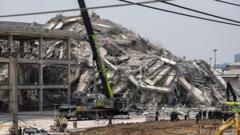On May 23, 2025, President Trump signed a set of executive orders aimed at invigorating the nuclear energy sector, calling for expedited regulatory approvals and new sites for reactors on federal lands.
Trump Administration Pushes for Rapid Expansion of Nuclear Energy

Trump Administration Pushes for Rapid Expansion of Nuclear Energy
The Trump administration has enacted new measures to significantly accelerate the construction of nuclear power plants in the U.S.
In a pivotal move for energy policy, President Trump has taken steps to expedite the construction of nuclear power plants throughout the United States. On May 23, 2025, he signed four executive orders designed to streamline the approval process by the Nuclear Regulatory Commission (NRC) and allow federal agencies, including the Energy and Defense departments, to site reactors on federal properties faster. One directive mandates that the NRC complete its approval process within 18 months, a significant reduction from current timelines, potentially paving the way for new technological innovations in the advanced reactor sector.
Trump's administration emphasized the urgent need for the expansion of nuclear power, particularly in light of increasing electricity demands from data centers and burgeoning technologies like artificial intelligence. “This is a monumental day for nuclear energy,” commented Doug Burgum, the Secretary of the Interior, celebrating the shift towards what he termed a necessary deregulation after decades of stringent oversight.
While Trump's energy strategy traditionally favored fossil fuels, the recognition of nuclear power's potential as a low-emission energy source has garnered bipartisan support. While some Democrats remain wary due to safety and nuclear waste concerns, many have begun to view nuclear energy as an essential element in combating climate change. Republicans, on the other hand, appreciate nuclear energy's capability to provide consistent power, unlike intermittent renewable sources such as wind and solar.
The administration's actions signal a transformative approach to energy generation in the United States, potentially reshaping power dynamics in the energy sector and contributing to the fight against climate change.
Trump's administration emphasized the urgent need for the expansion of nuclear power, particularly in light of increasing electricity demands from data centers and burgeoning technologies like artificial intelligence. “This is a monumental day for nuclear energy,” commented Doug Burgum, the Secretary of the Interior, celebrating the shift towards what he termed a necessary deregulation after decades of stringent oversight.
While Trump's energy strategy traditionally favored fossil fuels, the recognition of nuclear power's potential as a low-emission energy source has garnered bipartisan support. While some Democrats remain wary due to safety and nuclear waste concerns, many have begun to view nuclear energy as an essential element in combating climate change. Republicans, on the other hand, appreciate nuclear energy's capability to provide consistent power, unlike intermittent renewable sources such as wind and solar.
The administration's actions signal a transformative approach to energy generation in the United States, potentially reshaping power dynamics in the energy sector and contributing to the fight against climate change.























